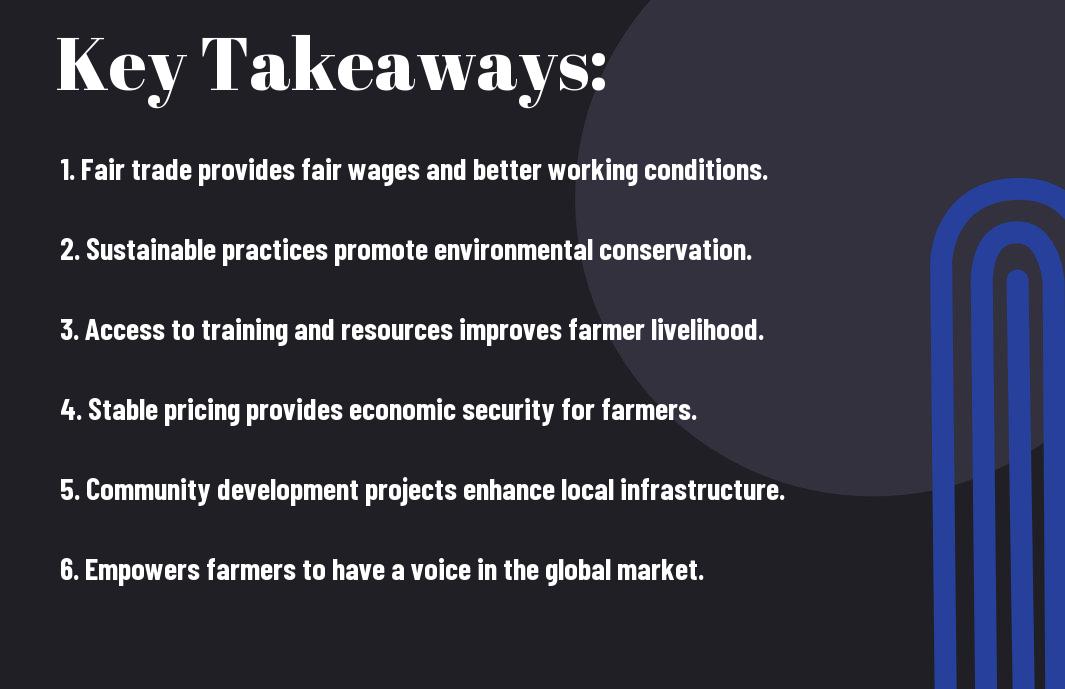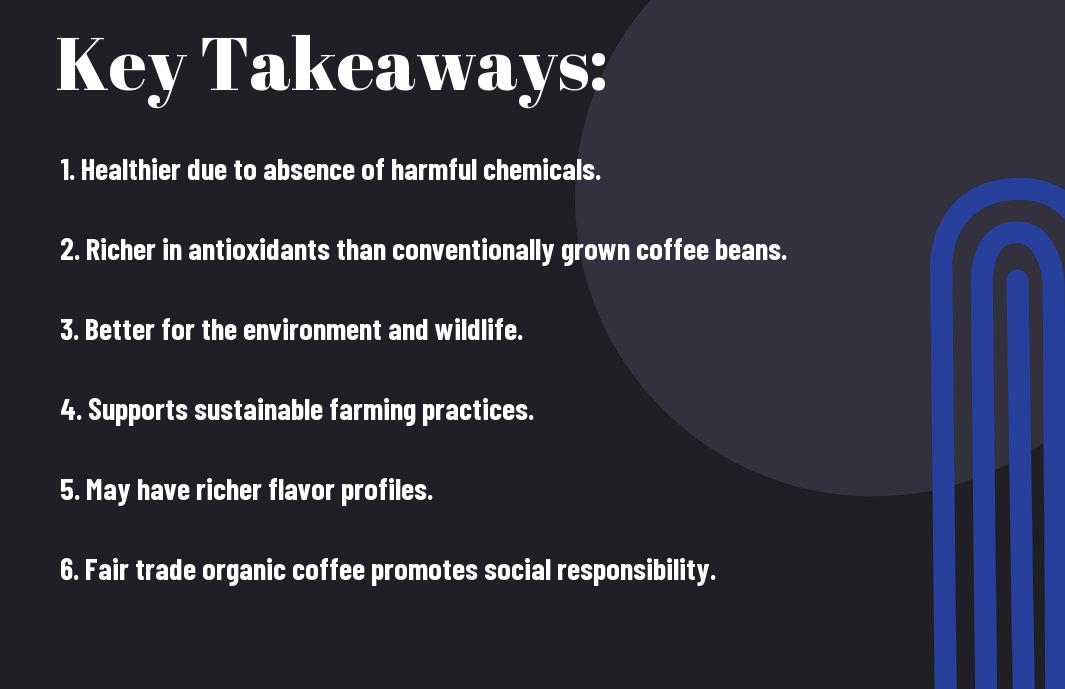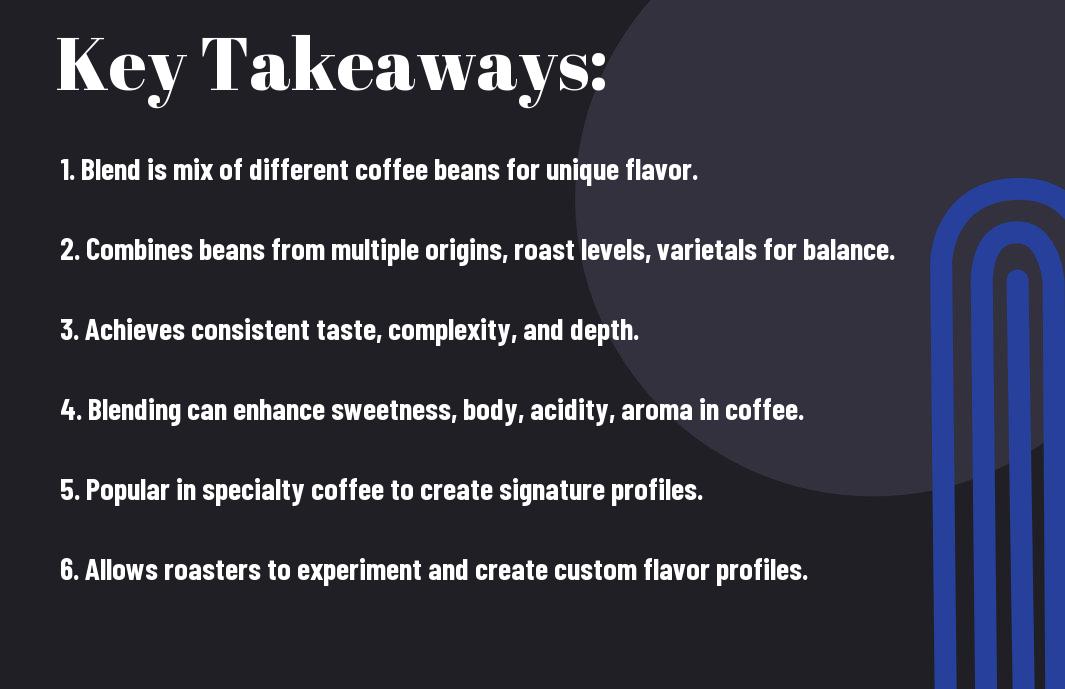With the daily hustle and bustle of modern life, many of us rely on a morning cup of coffee to kickstart our day. But have you ever wondered how exactly that steaming mug of java is able to jolt us awake and sharpen our focus? In this informative blog post, we will explore the fascinating connection between coffee consumption and mental alertness, delving into the science behind this popular pick-me-up.

Key Takeaways:
- Caffeine boosts mental alertness: Coffee contains caffeine, which is a stimulant that can help improve focus, alertness, and concentration.
- Improves reaction time: Consuming coffee can lead to faster reaction times, making it beneficial for tasks that require quick thinking and decision-making.
- Enhances cognitive function: Regular coffee consumption has been linked to improved cognitive function, memory, and overall brain health.
- Optimal dosage is key: While moderate coffee consumption can enhance mental alertness, excessive consumption can lead to negative side effects like jitteriness and insomnia.
- Individual tolerance varies: The effects of coffee on mental alertness can vary from person to person based on factors like genetics, tolerance levels, and overall health.

The Science Behind Coffee’s Effect
Caffeine’s Mechanism of Action
For many people, the key ingredient in coffee that boosts mental alertness is caffeine. Caffeine is a natural stimulant that belongs to a class of compounds called xanthines. When consumed, caffeine is quickly absorbed into the bloodstream and crosses into the brain. Once in the brain, caffeine acts as an adenosine receptor antagonist. Adenosine is a neurotransmitter that promotes relaxation and sleepiness. By blocking adenosine receptors, caffeine prevents the onset of drowsiness and promotes alertness.
How Caffeine Interacts with the Brain
Interacts with various neurotransmitters, including dopamine, norepinephrine, and acetylcholine, further enhancing cognitive function. Dopamine is known as the “feel-good” neurotransmitter and is involved in motivation and reward. Norepinephrine is a stress hormone and neurotransmitter that helps the body and brain remain vigilant and focused. Acetylcholine is involved in learning, memory, and overall cognitive function. By modulating the activity of these neurotransmitters, caffeine can improve mood, attention, reaction time, and overall mental performance.
With continued use, the brain can build a tolerance to caffeine, requiring higher doses to achieve the same effects. Additionally, abrupt cessation of caffeine consumption can lead to withdrawal symptoms such as headaches, fatigue, irritability, and difficulty concentrating. Moderation is key when it comes to reaping the cognitive benefits of caffeine without experiencing negative side effects.

The Benefits of Coffee on Mental Alertness
Even regular coffee consumption has been linked to several cognitive benefits, particularly in terms of mental alertness. The caffeine in coffee can have a positive impact on various aspects of cognitive function, including increased focus, enhanced reaction time, and improved memory and learning.
Increased Focus and Concentration
To many, a cup of coffee is synonymous with focus and concentration. Studies have shown that caffeine can help improve attention span and the ability to concentrate on tasks for extended periods. By blocking adenosine, a neurotransmitter that can inhibit the release of dopamine, caffeine promotes alertness and enhances cognitive performance.
Enhanced Reaction Time and Reflexes
An interesting aspect of coffee’s impact on mental alertness is its ability to improve reaction time and reflexes. Research has indicated that consuming moderate amounts of caffeine can lead to quicker reaction times, making it particularly beneficial for activities that require swift decision-making and responsiveness.
The enhanced reaction time and improved reflexes associated with coffee consumption can be attributed to caffeine’s stimulating effect on the central nervous system. By increasing neural firing in the brain and boosting the production of neurotransmitters like dopamine and norepinephrine, coffee can help individuals react more efficiently to stimuli.
Improved Memory and Learning
The caffeine in coffee has also been shown to benefit memory and learning capabilities. By blocking the action of adenosine, caffeine not only promotes alertness but also enhances the consolidation of new information in the brain. This means that individuals who consume coffee may experience improved short-term memory retention and an easier time learning new concepts.
Alertness:
With its ability to enhance cognitive functions such as focus, reaction time, and memory, coffee can be a valuable tool for boosting mental alertness in various situations. Whether you need to stay sharp during a busy workday or improve your performance in a challenging task, a cup of coffee can provide the cognitive edge you need to excel.
The Optimal Amount of Coffee for Mental Alertness
Despite the widespread popularity of coffee as a morning pick-me-up, determining the optimal amount to consume for enhanced mental alertness can be a delicate balance.
The Ideal Caffeine Dosage
Dosage plays a crucial role in the effects of coffee on mental alertness. The ideal caffeine dosage varies from person to person, depending on individual tolerance levels and sensitivity to caffeine. Generally, a moderate intake of caffeine, around 100-200 milligrams, can help improve focus and concentration without leading to jitteriness or anxiety.
Factors Affecting Caffeine Sensitivity
Alertness can be influenced by several factors affecting caffeine sensitivity, such as genetics, age, weight, and overall health. Some people may metabolize caffeine more quickly, while others may experience prolonged effects. Additionally, regular coffee drinkers may develop a tolerance to caffeine, requiring higher doses to achieve the same level of alertness.
- Assume that consuming coffee on an empty stomach can intensify the effects of caffeine.
With proper attention to these factors, individuals can better gauge the optimal amount of coffee to consume for increased mental alertness, thus harnessing the benefits of caffeine without the drawbacks of excessive intake.
- Assume that staying hydrated can help mitigate the potential side effects of caffeine, such as dehydration or increased heart rate.

The Dark Side of Coffee’s Effect
Not all effects of coffee on mental alertness are positive. While coffee can enhance focus and alertness for many people, it can have some negative side effects on certain individuals.
Jitters and Anxiety
One common side effect of consuming too much coffee is jitteriness and increased anxiety. The high levels of caffeine in coffee can cause a racing heart, trembling hands, and an overall feeling of unease in some individuals.
Insomnia and Sleep Disturbances
Any disruption in sleep patterns can have a significant impact on mental alertness. Consuming coffee, especially in the afternoon or evening, can lead to difficulties falling asleep and result in insomnia or disrupted sleep patterns.
The lack of quality sleep can impair cognitive function and make it harder to concentrate and stay alert during the day.
Addiction and Withdrawal
The consumption of coffee has the potential to lead to physical dependence and withdrawal symptoms when not consumed. Regular coffee drinkers may experience withdrawal symptoms such as headaches, fatigue, irritability, and difficulty concentrating when they try to cut back on their caffeine intake.
Anxiety disorders may be exacerbated by the withdrawal effects of suddenly stopping or reducing coffee consumption.
Jitters, headaches, and irritability are common symptoms experienced by individuals going through caffeine withdrawal.
Coffee’s Impact on Different Age Groups
Children and Adolescents
An vital factor to consider when discussing the effects of coffee on mental alertness is the age of the individual. Children and adolescents are particularly sensitive to caffeine’s stimulating effects due to their developing brains and bodies. Consuming high amounts of coffee at a young age can lead to an increased heart rate, jitteriness, and difficulty concentrating. It is crucial for parents and guardians to monitor and limit coffee intake in this age group to prevent any negative impacts on their cognitive development.
Adults and Seniors
To understand the impact of coffee on mental alertness in adults and seniors, we must acknowledge that caffeine affects individuals differently based on their tolerance levels and overall health. For many adults, moderate coffee consumption can enhance focus, concentration, and overall cognitive function. However, excessive caffeine intake can lead to anxiety, insomnia, and other negative side effects. Seniors, in particular, may need to be cautious with their coffee consumption as aging can impact how the body processes caffeine.
Adults who are looking to boost their mental alertness with coffee should be mindful of their overall caffeine intake from various sources, including energy drinks and medications. It is vital to strike a balance that provides the benefits of enhanced focus and concentration without causing adverse effects on sleep or anxiety levels. Consulting with a healthcare provider can help individuals determine the right amount of coffee for their specific needs and optimize its cognitive benefits.
Interactions with Other Substances
All substances interact differently with coffee. Pertaining to medications and supplements, it’s important to be cautious of potential interactions with caffeine. Some medications, such as certain antibiotics, asthma medications, and psychiatric drugs, can either be amplified or inhibited by caffeine consumption. It’s always best to consult with a healthcare provider if you are unsure about how coffee may interact with your medications or supplements.
Medications and Supplements
For individuals taking prescription medications or supplements, it’s crucial to understand how caffeine in coffee could impact their effectiveness. Caffeine can interfere with the absorption of certain drugs or intensify their effects, leading to potential side effects. Being aware of these interactions can help individuals manage their caffeine intake appropriately and avoid any unwanted outcomes.
Food and Beverages
One should also be mindful of how coffee interacts with other food and beverages. For instance, consuming coffee with high-sugar or high-fat foods may lead to a crash later on, affecting mental alertness. Additionally, pairing coffee with alcohol can have adverse effects on both the body and mind. Understanding these interactions can help individuals make informed choices about their coffee consumption and overall well-being.
Food and beverage choices can play a significant role in how coffee affects mental alertness. Consuming a balanced diet alongside coffee can enhance its positive effects on cognitive function. Pairing coffee with nutrient-dense foods like fruits, vegetables, and whole grains can help sustain mental alertness throughout the day.
Summing up
Following this exploration of how coffee affects mental alertness, it is clear that caffeine can positively impact cognitive functions such as attention, memory, and mood. However, moderation is key, as excessive consumption of coffee can lead to negative side effects such as anxiety and sleep disturbances. Understanding the balance between the benefits and risks of coffee consumption is vital for harnessing its potential to enhance mental alertness effectively.
FAQ
Q: What is the connection between coffee and mental alertness?
A: Coffee contains caffeine, a natural stimulant that blocks the neurotransmitter adenosine in the brain, leading to increased neuron firing. This results in improved mood, energy levels, and most importantly, mental alertness.
Q: How long does it take for coffee to improve mental alertness?
A: Typically, it takes around 30 minutes for the effects of caffeine in coffee to be felt in the body. Peak levels of alertness are usually reached within 1 to 1.5 hours after consumption and can last for several hours.
Q: Are there any negative effects of consuming too much coffee for mental alertness?
A: While moderate coffee consumption can enhance mental alertness, excessive intake can lead to jitteriness, anxiety, insomnia, and dependency. It’s important to find the right balance and listen to your body’s signals to optimize the benefits of coffee for mental alertness.











































